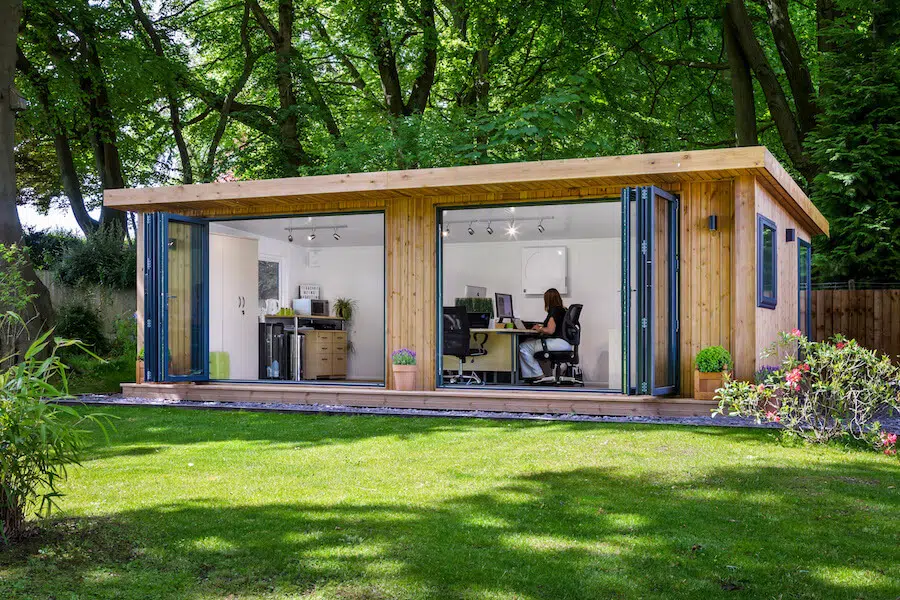Most restrictions in England will end tomorrow as Plan B comes to an end!
Which side of the divide do you belong to? Is it time to get back to “normal” and for everyone to go back to the office? Or is it too early and we should all carry on working from home until things are a bit clearer.
The truth is even when it is time to return to the office many of us will also be choosing to adopt some sort of a hybrid model. A bit of office and a bit of working from home.
Latest figures suggest that 37% of working UK adults did at least some work from home in 2020 compared to 22% in the previous year.
This would suggest that the hybrid model is here to stay. Many of our clients are asking if they should invest in a home office by extending the home or build a working pod in the garden?
Should I build a home office?
There are obvious advantages of having a garden office.
It gives the space for separation which is much better for your work/life balance and will help you be more disciplined with your time.
It also gives you the opportunity to curate your ideal working environment which is exciting for many. But what are the tax implications? Yes, tax implications! Let’s take a quick look and answer some key questions.
Can I claim back the building cost?
In short, the answer to this question is no!
There are no capital allowances available for the actual build to offset against your corporation tax. However, the cost of installation of utilities are covered by capital allowances and can be deducted against your tax liabilities. Examples would be electrical wiring, plumbing etc.
You can also claim for your office furniture and IT equipment.
Income Tax
If you build the office from your own personal funds, then you could charge your Company rent for the office space. But this rent will need to be reported in your personal tax return and tax will need to be paid under self-assessment.
Remember the tax rates for a company currently is 19% and will remain so until 31st March 2023. As an individual you may be paying tax at 20%, 40% or 45%.
We would suggest that you do not look at the payment/charging of rent in isolation but as part of your overall remuneration planning.
Capital Gains Tax
Normally when you sell your home, you do not have a capital gains tax (CGT) liability because the gain or profit is covered by principal private residence relief (PPR).
However, if one room is used 100% of the time exclusively for work purposes it could potentially impact this relief and depending on the gain there may be a CGT liability.
Whether or not any CGT will apply will also depend on what type of garden office you have built. If it is one of those that you can dismantle when you move and take it with you, then there will be no CGT.
A more permanent structure could have tax consequences.
Our tip is to make sure you use the room for something else during the weekends for some personal use too. Maybe have a small TV and a sofa or even an exercise bike in the corner. Something else you can do in that room apart from working.
Benefit in Kind for personal use
When you build the garden office through your Company and there is personal usage, you may end up with a benefit-in-kind.
However, with careful planning this can be kept to a minimum.
See here for full HMRC guidance.
Value Added Tax (VAT)
If you build the garden office via your business, then you should be able to claim the VAT. You can also claim back the VAT for the furniture and equipment you use in the office. You need to make sure the purchases are via the business, and you keep the records.
To successfully claim the VAT, you also need to make sure any personal use is incidental.
Other Considerations
Don’t forget there are also other considerations to consider such as council tax, insurance cover and utilities.
It is highly unlikely but there is chance that your council may want to assess your office to establish whether it is liable to business rates but there is always the small business rates relief.
Finally, don’t forget to check the planning regulations to make sure you don’t need an actual planning permission to build the home office in the garden.
This is a complex area and if you are thinking of building an office in the garden make sure you know your facts and figures. Call your normal director or manager at Myers Clark if you want to discuss the tax implications any further.
If you are not yet working with us but would like to explore the idea visit get started with myers-clark

